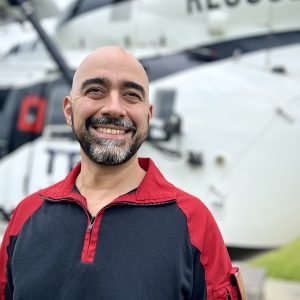It was the great outdoors that brought Alex Mihalcea to New Zealand but his career had its beginnings in the turmoil-ridden regions of Eastern Europe.
In late-2024 the Romania-native joined the Trust Tairāwhiti Eastland Rescue Helicopter team as a critical care flight paramedic after five years working with Hato Hone St John.
But his early education was in psychology, his training leading him to European Union projects where he worked with both children and adults affected by war and geopolitical conflicts.
“Because the environments we worked in were so dangerous I wanted to be in a position to help my team members if anything ever went wrong,” Alex says of his decision to volunteer with the Bucharest Ambulance Service.
“I liked it so much I decided to continue training in paramedicine.”
A couple of years later, in 2010, that commitment took him to Germany, where he worked in Neuss, Heinsberg and Aachen, progressing from paramedic intern to a fully-fledged advanced paramedic with responsibilities in co-ordination, supervision, education and leadership.
Then in early 2019 he and partner Luca – an environmental scientist – acted on their long-held dream to move to Aotearoa.
“We both love New Zealand and were looking for a chance to move to a country that felt like a good cultural fit,” he says.
“For us, that means being part of a society where people are committed to discussing things in a way that takes them to a solution together.
“We also really enjoy being outdoors, in nature, and there’s no better place to do that.”
The couple first headed to Invercargill where Alex worked for three-and-a-half years as an intensive care paramedic, educator, clinical auditor and incident manager, and where he first saw New Zealand rescue helicopter teams in action.
“In Germany, specialised hospitals are almost always close by so helicopter services are used differently, while in Invercargill the local hospital can treat certain conditions but the nearest specialised centre is in Dunedin, over two hours away by road,” he says.
“So it was fascinating to watch the team down there in action, observing the breadth of situations they have to deal with and the complexity of work, both clinically and with rescues.”
Seeking warmer climes, Alex in 2022 transferred to Auckland where – before joining Eastland Rescue Helicopter’s ops company, Search and Rescue Services (SRSL) – he again combined roles in both on-the-job critical care and in clinical support.
The latter role saw him spend time working St John’s Air Desk — which carries out the dispatch and co-ordination of air ambulance services throughout the country – again putting him in contact with heli-rescue teams.
“So when the job with Eastland Rescue Helicopter came up I thought it was a brilliant opportunity to engage with communities in a more rural environment, which I have long been interested in.”
After spending a month doing clinical upskilling at SRSL’s base in Hamilton and aviation training at their site in Taupo, Alex flew his first shift with the Gisborne team in mid-October, juggling commitments back in Auckland by managing his four-day/night blocks on a fly-in-fly-out basis.
“I’ve absolutely loved it and everyone I’ve worked with in Gisborne are top professionals in their specialities, so it’s been an amazing experience,” he says.
“The reality is that you can’t have a fully-equipped hospital in every township but you can have a helicopter that can get a highly-trained team to scene, and fast.
“It feels great to be part of a service that delivers good healthcare exactly where it is needed.”
CAPTION: MULTI-TASKING: While he loves the immediacy of rapid response, Trust Tairāwhiti Eastland Rescue Helicopter critical care flight paramedic Alex Mihalcea also plans to continue his academic research, looking particularly at the experiences of vulnerable populations.
